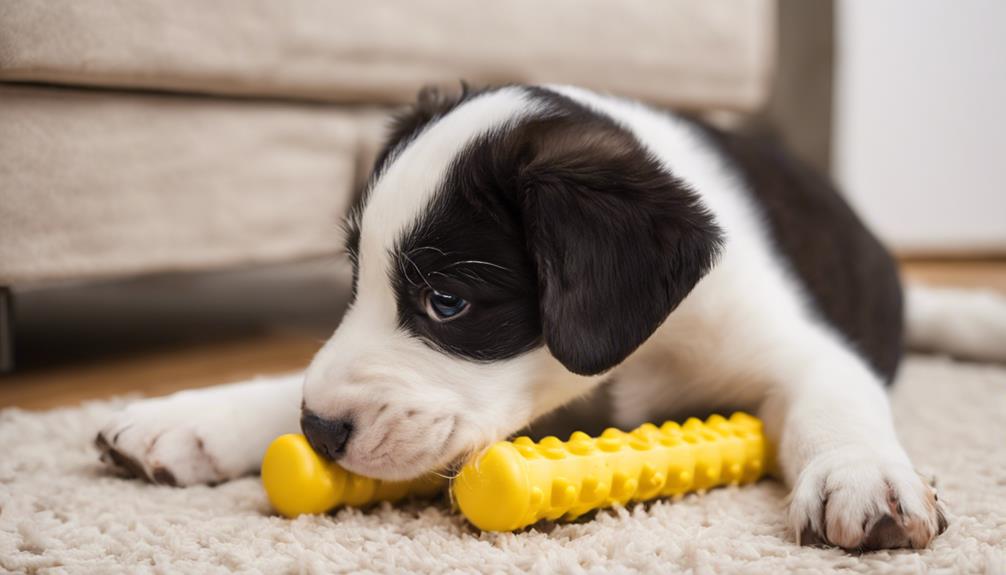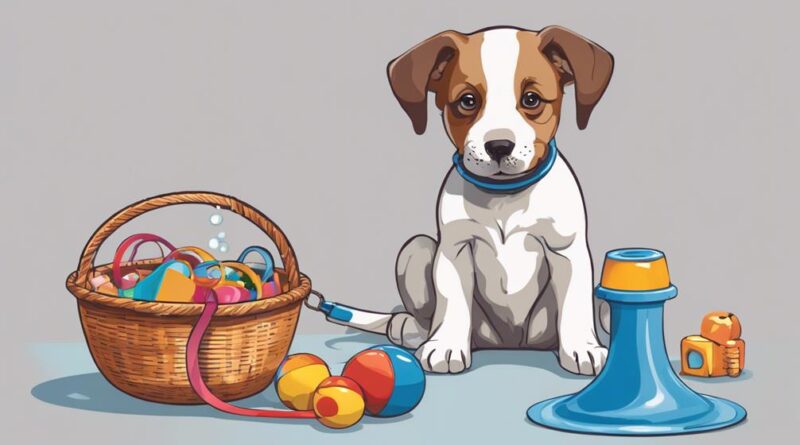What Are Essential Puppy Care and Training Tips?
Imagine your puppy as a blank canvas waiting for the brushstrokes of guidance and care to shape their future.
From selecting the right breed to nurturing their growth, each step in your puppy's journey is crucial.
But what are the key elements that will pave the way for a well-rounded and disciplined companion?
Let's explore the foundational principles of essential puppy care and training that every responsible pet parent should consider.
Choosing the Right Puppy Breed
When selecting the right puppy breed, consider your lifestyle and living situation to ensure a good match. Puppy temperament and breed compatibility play a crucial role in finding the perfect furry companion. Some breeds are more energetic and require ample exercise, while others may be more laid back and suited for apartment living. It's essential to research different breeds to find one that aligns with your activity level and living space.
Puppy training methods and obedience techniques are also important factors to consider when choosing a breed. Some breeds are known for their intelligence and eagerness to please, making them easier to train, while others may require more patience and consistent training. Understanding the training needs of different breeds can help set realistic expectations and create a harmonious relationship between you and your new puppy.
Setting Up a Safe Environment
Consider the layout of your home and potential hazards when setting up a safe environment for your new puppy. Start by puppy-proofing your home, removing any small objects that could be swallowed, securing electrical cords, and blocking off areas that are off-limits. Make sure to keep toxic plants, chemicals, and medications out of reach. Create a cozy and safe space for your puppy to rest, with a comfortable bed and access to water.
When it comes to outdoor exploration, ensure your puppy's environment is secure. Check for any gaps in fences or gates that your puppy could slip through. Supervise outdoor playtime to prevent your puppy from getting into potentially dangerous situations. Provide plenty of toys and stimulation to keep your puppy entertained in a safe manner. Remember that outdoor areas should be free of sharp objects, toxic plants, and any other hazards. With these precautions in place, you can create a safe and enjoyable environment for your new furry friend.
Establishing a Routine Schedule
To ensure your puppy's well-being and development, establish a consistent daily routine that includes feeding, potty breaks, playtime, and training sessions. Consistency is key when it comes to potty training, so make sure to take your puppy outside first thing in the morning, after meals, and before bedtime. Set up a feeding schedule to regulate your puppy's meals, typically 3-4 times a day for young pups. This routine helps with digestion and prevents accidents in the house.
Additionally, consider your puppy's exercise needs and incorporate a playtime routine into your schedule. Puppies are full of energy and require regular physical activity to stay healthy and happy. Engage in interactive play sessions that stimulate both their mind and body. This not only helps with their development but also strengthens the bond between you and your furry friend.
Basic Puppy Training Techniques
Start incorporating basic puppy training techniques into your daily interactions to establish a strong foundation for obedience and behavior. Positive reinforcement is a key element in training your puppy effectively. This technique involves rewarding your puppy with treats, praise, or toys when they exhibit good behavior. By positively reinforcing desired behaviors, your puppy will be more likely to repeat them in the future.
Crate training is another valuable technique that can help with housebreaking and providing your puppy with a safe space to rest.
Basic Puppy Training Techniques:
- Positive Reinforcement: Use treats, praise, or toys to reward good behavior and encourage repetition.
- Crate Training: Introduce your puppy to a crate as a safe and comfortable space for resting and sleeping.
- Consistency: Be consistent in your commands, rewards, and routines to help your puppy understand what's expected of them.
Socializing Your Puppy
As your puppy grows and learns basic training techniques, it's crucial to prioritize socializing them to ensure they develop proper behavior and interactions with other dogs and people.
Playdate etiquette is essential in helping your puppy learn how to interact with other dogs in a positive manner. Consider enrolling your puppy in puppy classes to provide structured socialization opportunities and guidance from professionals.
Understanding behavior cues and canine body language is key to interpreting how your puppy is feeling and reacting in different social situations. Monitor your puppy's reactions during social interactions to ensure they're comfortable and not exhibiting signs of distress.
Encouraging positive social experiences will help your puppy build confidence and develop good social skills. Remember, socializing your puppy is a continuous process that requires patience and consistency.
Health and Nutrition Basics
Prioritize your puppy's health and nutrition by ensuring they receive a balanced diet and regular veterinary check-ups. To keep your furry friend healthy and happy, it's crucial to pay attention to their exercise requirements and dietary needs.
- Regular Exercise: Just like humans, puppies need regular exercise to stay fit and maintain a healthy weight. Make sure to provide your puppy with enough physical activity based on their breed and age.
- Balanced Diet: Feed your puppy a high-quality, balanced diet that's suitable for their age, size, and breed. Consult with your veterinarian to determine the best food options for your furry companion.
- Veterinary Check-ups: Regular visits to the vet are essential to monitor your puppy's overall health, vaccination schedule, and address any potential health concerns early on. Stay proactive in scheduling and attending these check-ups to ensure your puppy's well-being.
Handling Common Behavior Issues

To address common behavior issues in your puppy, focus on understanding their specific triggers and implementing positive reinforcement training techniques.
Potty training solutions are essential for teaching your puppy where to go to the bathroom. Establish a consistent schedule for feeding and bathroom breaks, praising them when they do their business outside.
When faced with behavioral challenges like chewing on furniture due to teething troubles, provide appropriate chew toys and redirect their attention when they start to gnaw on things they shouldn't.
Crate training essentials can help with creating a safe space for your puppy and aiding in house training. Introduce the crate gradually, making it a comfortable and positive environment for them to relax in.
Continuing Education and Enrichment
For ongoing development and mental stimulation for your puppy, consider incorporating continued learning opportunities and enrichment activities into their daily routine. Engaging your furry friend in various enrichment activities can help keep them mentally sharp and prevent boredom.
Here are some suggestions to enhance your puppy's learning and overall well-being:
- Enrichment Activities: Introduce new challenges such as puzzle toys or scent games to keep your puppy's mind active and engaged.
- Interactive Toys: Provide interactive toys that dispense treats or require problem-solving skills to encourage mental stimulation.
- Bonding Exercises: Spend quality time with your puppy through training sessions, interactive playtime, or simply cuddling to strengthen your bond and enhance their social skills.
Incorporating these activities into your puppy's routine not only provides mental stimulation but also helps in building a strong bond between you and your furry companion.
Frequently Asked Questions
How Can I Prevent My Puppy From Chewing on Furniture and Belongings?
To prevent your puppy from chewing on furniture and belongings, offer teething toys and distractions to redirect their chewing behavior. Use positive reinforcement and consistency in training to guide them towards appropriate chew items.
Praise and reward your puppy when they chew on the right toys. Avoid scolding or punishing them for chewing on the wrong things. With patience and reinforcement, your puppy will learn what's acceptable to chew on.
What Are Some Tips for Introducing My Puppy to Other Pets in the Household?
When introducing your puppy to other pets in the household, remember playdate etiquette. Start by supervising the interactions and providing a safe space.
Allow them to approach each other slowly, sniff, and get acquainted. Be patient and give positive reinforcement for good behavior. Watch out for signs of sibling rivalry and intervene if things get too tense.
With time and proper introductions, your pets can become great friends and coexist peacefully.
How Do I Handle My Puppy's Separation Anxiety When I Need to Leave the House?
When handling your puppy's separation anxiety, try gradual training methods and positive reinforcement. Start with short periods of alone time and slowly increase it.
Leave comforting items like toys or blankets. Practice leaving and returning multiple times a day to desensitize your puppy.
Avoid making a big deal out of departures and arrivals. Consult a professional trainer for personalized advice on separation anxiety solutions and effective training techniques for your puppy.
Is It Necessary to Crate Train My Puppy, and if So, How Do I Go About It?
Crate training your puppy can be a helpful tool for their development. It offers a safe space for them and aids in house training. Challenges may arise, like initial resistance. However, with patience and positive reinforcement, most puppies adapt well.
If crate training isn't for you, consider alternatives like using a playpen or baby gates. Many pet owners have found success with these options. Remember, each puppy is unique, so find what works best for yours.
What Are Some Ways to Keep My Puppy Mentally Stimulated and Prevent Boredom?
To keep your puppy mentally stimulated and prevent boredom, try interactive toys and mental exercises. Engage in outdoor adventures and set up play dates with other dogs. These activities will help keep your puppy's mind active and prevent them from getting restless or bored.
Regular mental stimulation is essential for your puppy's overall well-being and can also help in training and behavior management.
Conclusion
Now that you've learned the essential puppy care and training tips, you're ready to provide your furry friend with the best possible start in life.
Remember to:
- Choose the right breed
- Create a safe environment
- Establish a routine
- Train effectively
- Socialize properly
- Prioritize health and nutrition
- Address behavior issues
- Continue learning and enriching your puppy's life
With dedication and patience, you'll build a strong bond and ensure a happy and well-adjusted companion for years to come.
